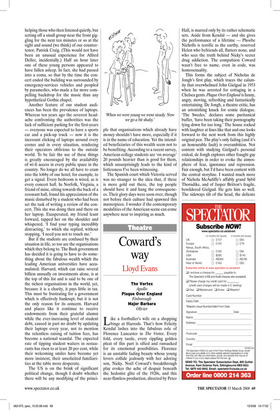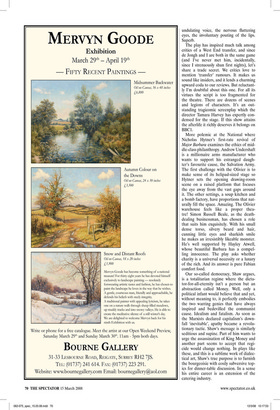Coward’s way
Lloyd Evans
The Vortex Apollo Plague Over England Finborough Major Barbara Olivier
Like a footballer’s wife on a shopping binge at Harrods. That’s how Felicity Kendal lashes into the fabulous role of Florence Lancaster in The Vortex. Every fold, every tassle, every rippling golden pleat of this part is sifted and ransacked for its emotional possibilities. Florence is an unstable fading beauty whose young lovers collide jealously with her adoring son, Nicky. Noël Coward’s breakthrough play evokes the ache of despair beneath the hedonist glitz of the 1920s, and this near-flawless production, directed by Peter Hall, is marred only by its rather schematic sets. Aside from Kendal — and she gives the performance of a lifetime — Phoebe Nicholls is terrific as the earthy, reserved Helen who befriends all, flatters none, and who sees the truth behind Nicky’s secret drug addiction. The compulsion Coward wasn’t free to name, even in code, was homosexuality.
This forms the subject of Nicholas de Jongh’s first play, which traces the calamity that overwhelmed John Gielgud in 1953 when he was arrested for cottaging in a Chelsea gents. Plague Over England is funny, angry, moving, refreshing and fantastically entertaining. De Jongh, a theatre critic, has an astonishing knack for comic dialogue. ‘The Swedes,’ declares some puritanical buffer, ‘have been taking their pornography lying down for too long.’ The house rocked with laughter at lines like that and one looks forward to the next work from this highly original pen. The play’s only failing (and it’s an honourable fault) is overambition. Not content with studying Gielgud’s personal ordeal, de Jongh explores other fraught gay relationships in order to evoke the atmosphere of fear, ignorance and repression. Fair enough, but I’d have been content with the central storyline. I wanted much more of Nichola McAuliffe’s affably grand Sybil Thorndike, and of Jasper Britton’s fragile, bewildered Gielgud. He gets him so well. Sb_s_10.06.06qxd 3/707 11 The sideways tilt of the head, the delicate undulating voice, the nervous fluttering eyes, the involuntary pouting of the lips. Superb.
The play has inspired much talk among critics of a West End transfer, and since de Jongh and I are both in the same game (and I’ve never met him, incidentally, since I strenuously shun first nights), let’s share a trade secret. We critics love to mention ‘transfer’ rumours. It makes us sound like insiders, and it lends a charming upward coda to our reviews. But reluctantly I’m doubtful about this one. For all its virtues the script is too fragmented for the theatre. There are dozens of scenes and legions of characters. It’s an outstanding tragicomic screenplay which the director Tamara Harvey has expertly condensed for the stage. If this show attains the afterlife it richly deserves it belongs on BBC1.
More polemic at the National where Nicholas Hytner’s first-rate revival of Major Barbara examines the ethics of middle-class philanthropy. Andrew Undershaft is a millionaire arms manufacturer who wants to support his estranged daughter’s favourite cause, the Salvation Army. The first challenge with the Olivier is to make sense of its helipad-sized stage so Hytner sets the opening drawing-room scene on a raised platform that focuses the eye away from the vast gaps around it. The other settings, a soup kitchen and a bomb factory, have proportions that naturally fill the space. Amazing. The Olivier warehouse feels like a proper theatre! Simon Russell Beale, as the deathdealing businessman, has chosen a role that suits him exquisitely. With his small dense torso, silvery beard and hair, cunning little eyes and sharkish smile he makes an irresistibly likeable monster. He’s well supported by Hayley Atwell, whose beautiful Barbara has a compelling innocence. The play asks whether charity is a universal necessity or a luxury of the rich. And its answer is pure Fabian comfort food.
Our so-called democracy, Shaw argues, is a totalitarian regime where the dictator-for-all-eternity isn’t a person but an abstraction called Money. Well, only a political infant would believe that and yet, without meaning to, it perfectly embodies the two warring genies that have always inspired and bedevilled the communist cause. Idealism and fatalism. As soon as the Marxists declared capitalism’s downfall ‘inevitable’, apathy became a revolutionary tactic. Shaw’s message is similarly seditious and supine. Part of him wants to urge the assassination of King Money and another part seems to accept that regicide would change nothing. In plays like these, and this is a sublime work of dialectical art, Shaw’s true purpose is to furnish the bourgeoisie with cosily subversive topics for dinner-table discussion. In a sense his entire career is an extension of the catering industry.



























































































 Previous page
Previous page